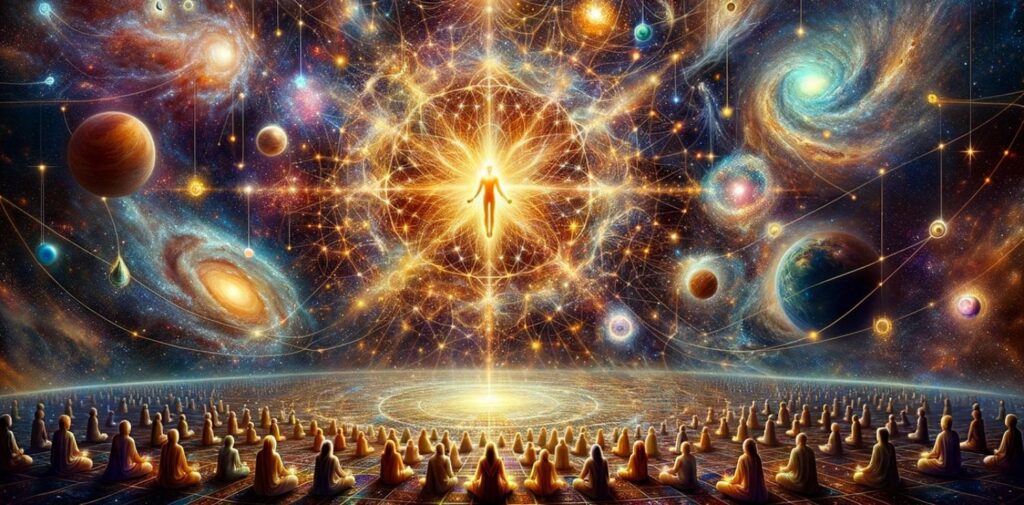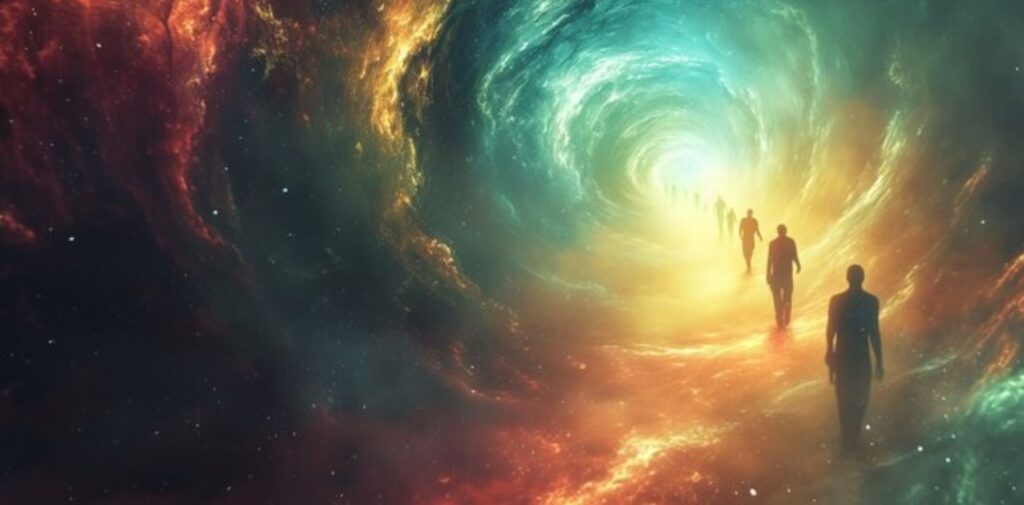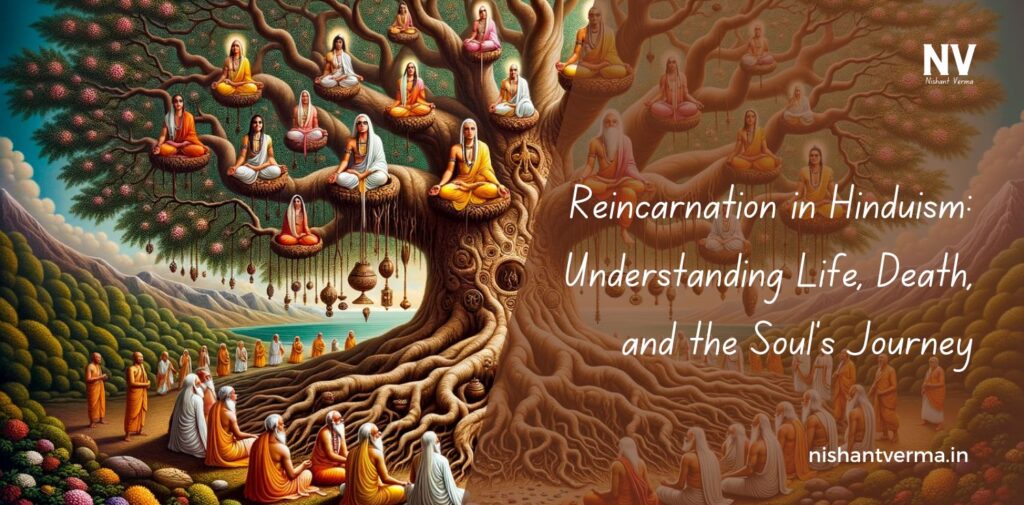Reincarnation is a fascinating concept that is deeply rooted in Hinduism. The idea that life doesn’t end with death but continues in a new form is both mystical and thought-provoking. In Hindu beliefs, this journey of life, death, and rebirth is part of a never-ending cycle called Samsara. Let’s explore the Reincarnation in Hinduism, and how it shapes the understanding of life, death, and the soul’s eternal journey.
What is Reincarnation in Hinduism?
Reincarnation, in simple terms, means the rebirth of the soul into a new body after death. This belief is central to Hinduism, where it is taught that the soul is eternal and never truly dies. Instead of ending with death, the soul moves from one body to another, in a continuous cycle.
This cycle of birth, death, and rebirth is called Samsara. Samsara is the endless loop that every soul goes through, and it is believed to continue until the soul reaches spiritual liberation, called Moksha.
The Eternal Soul: Atman
At the heart of the Hindu understanding of reincarnation is the belief in the Atman, or the soul. According to Hindu philosophy, the Atman is the true self of every person. It is not your body, mind, or emotions, but rather the divine, eternal essence that resides within you.
The Atman is unchanging, immortal, and indestructible. When the body dies, the Atman doesn’t perish. Instead, it moves on to another body, beginning a new life cycle. This belief contrasts with the idea that life ends at death in many other religions and philosophies.
“The body is temporary, but the soul is eternal.”
This simple thought captures the essence of reincarnation in Hinduism. The soul may inhabit many different bodies throughout its journey, but it never dies. It is through these many lifetimes that the soul learns, grows, and evolves.

The Cycle of Samsara
Samsara, as mentioned earlier, is the endless cycle of life, death, and rebirth. It is governed by the Law of Karma. Karma refers to the actions or deeds that a person performs during their life. These actions, whether good or bad, determine the future of the soul, including its next birth.
- Good Karma: If a person leads a virtuous life and performs good actions, it creates positive karma. This positive karma leads to better circumstances in the next life, such as being born into a loving family or having good health.
- Bad Karma: On the other hand, if someone lives selfishly or harms others, they accumulate negative karma. This can lead to more challenging situations in the next life, such as being born into poverty or facing hardships.
The goal is to accumulate good karma over many lifetimes, as this helps the soul evolve towards spiritual growth and ultimately liberation.
How Karma Affects Reincarnation
Karma doesn’t just affect the next life—it affects every part of the soul’s journey. Every action a person takes has consequences, not only in the current life but also in future rebirths. By acting in ways that promote love, kindness, honesty, and selflessness, the soul can move closer to achieving Moksha.
This process of accumulating good karma, learning life lessons, and evolving spiritually continues over many lifetimes. The idea is that over time, the soul will become purer and closer to achieving Moksha, the ultimate goal.
The Ultimate Goal: Moksha
While Samsara is the ongoing cycle of birth and rebirth, the goal in Hinduism is to escape from it. This liberation from the cycle of reincarnation is called Moksha.
Moksha is achieved when the soul realizes its true nature—that it is not separate from the divine. In Hinduism, the ultimate reality is called Brahman, the supreme, unchanging reality that is beyond time and space. Moksha is the state of being united with Brahman, where the soul experiences eternal peace and bliss, free from the cycle of Samsara.

How to Achieve Moksha?
To break free from the cycle of reincarnation and achieve Moksha, a soul must transcend the limitations of the material world. Hinduism teaches that this can be done through:
- Selfless Action (Karma Yoga): Performing good deeds without any attachment to the outcomes or rewards. Acting in the service of others, without expecting anything in return, purifies the soul.
- Devotion (Bhakti Yoga): Devotion to God and surrendering oneself to the divine with love and faith. Bhakti Yoga is a path of deep personal connection with the divine.
- Knowledge (Jnana Yoga): Gaining wisdom and understanding of the true nature of the self. Jnana Yoga focuses on meditation, contemplation, and the realization that the soul is one with Brahman.
- Meditation (Dhyana Yoga): Through deep meditation, one can quiet the mind, connect with the inner self, and understand the nature of reality. This is often seen as a direct way to experience the divine presence within.
By following one or more of these paths, a person can purify their soul, reduce their karma, and eventually attain Moksha.

Reincarnation and the Universe
The cycle of reincarnation also reflects the natural order of the universe. Just like seasons change in nature, life and death in the universe follow a rhythm. Birth is a beginning, and death is an end, but both are necessary steps in the cycle of existence. Each life is an opportunity for growth, learning, and self-discovery.
In Hinduism, everything in the universe is interconnected. The belief in reincarnation encourages people to act with compassion, understanding, and respect for all living beings because every soul is on a similar journey toward spiritual enlightenment. It teaches that all life is sacred and that every living being has a role to play in the cosmic order.
Different Life Forms: Why Are We Born in Different Bodies?
One of the interesting aspects of reincarnation in Hinduism is that the soul can be born in different forms across many lifetimes. This means that a soul might experience life as a human, an animal, a plant, or even an insect, depending on the karma it has accumulated.
Some texts in Hinduism suggest that the soul can move from a more advanced life form to a simpler one (or vice versa) depending on its actions in previous lives. This teaches a deep respect for all forms of life, as every living being is on its own spiritual journey, just like humans.
Conclusion: Reincarnation as a Path to Growth
In Hinduism, reincarnation is not just about the soul being born again and again; it’s about growth and evolution. Each new life offers an opportunity to learn more about ourselves, our actions, and our connection to the world around us. It reminds us that life is precious, and every action has consequences, both in this life and in future lifetimes.
By understanding the concept of reincarnation, we are encouraged to live with more compassion, kindness, and awareness. The ultimate goal is to learn, grow, and reach a state of spiritual freedom, where the soul is no longer bound by the cycle of birth and death but united with the divine.
Whether you are born once or many times, the essence of Hindu reincarnation is clear: the soul is on a journey, and that journey is one of endless possibilities for transformation and growth.




